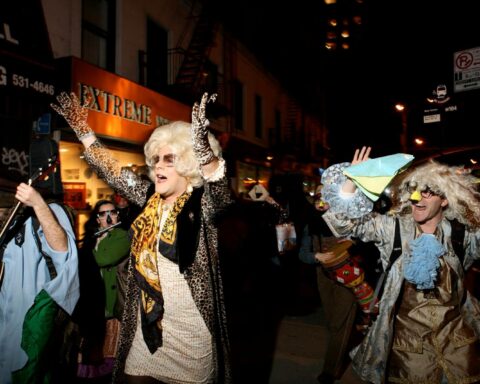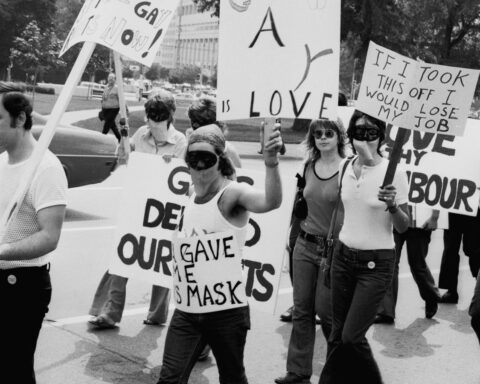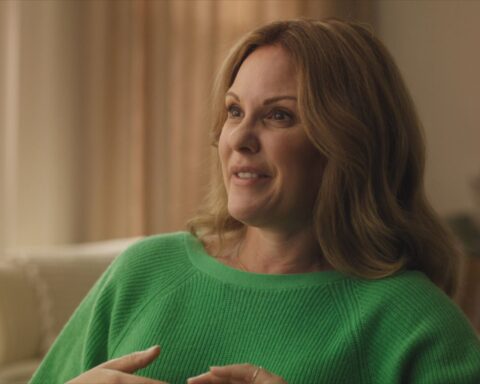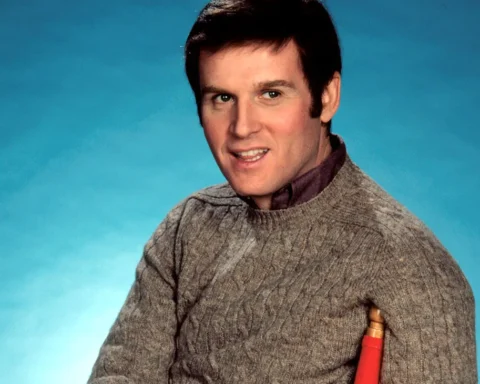Here is a nifty series of books from Vancouver’s Arsenal Pulp Press —with eight published and 13 to come—grouped under the rubric “Queer Film Classic,” each slender paperback focusing on a film that is of unique interest to homosexuals.
Nomenclature aside, what marks each of the films under discussion is that they have a theme or idea that suggests somebody is having sex, or thinking about having sex, with their own gender. Because only a minority of people are born this way, the rest of humanity has always looked upon homosexuals as exotic. This has made for some hellishly unpleasant lives, grotesque societal hypocrisy and much timeless art.
The Queer Film Classic series is the brainchild of Montreal-based editors Matthew Hays (who is also a contributing editor of POV) and Thomas Waugh, themselves both widely published scholars, who modelled the books on the British Film Institute series of notable books on film. The titles here are as disparate as the authors and their style of writing but all are trustworthy explorations of their chosen topic.There is often overlap in the telling of gay history, and sometimes the whiff of dogmatic pedagogy, but none falls short of its subject.
Thomas Waugh and Jason Garrison’s Montreal Main wanders into the incendiary territory of pedophilia in the best tradition of queer radical politics; Shohini Ghosh’s fascinating study of Fire, by Deepa Mehta, brings to light Indian sexual mores; José Quiroga writes a fine testament to Spanish director Pedro Almodóvar’s Law of Desire; Jon Davies writes a sly love letter to Warhol’s Trash; Noah Tsika does an excellent job dissecting the popular Hollywood film Gods and Monsters, delving into that thorny trope of the doomed gay man destined to die in the last reel (a plot point often taken from real life, viz. Harvey Milk).
Three new books have just been published: Greg Youmans’ study of the 1977 documentary Word is Out; Susan Knabe and Wendy Gay Pearson’s Zero Patience, about the 1993 agitprop AIDS musical by John Greyson; and Will Aitken on the 1971 Visconti classic Death in Venice, itself based on the novella by Thomas Mann.
The single most important thing about the groundbreaking documentary Word is Out was its mass distribution on TV via PBS in October of 1978. Conceived by the brother/sister team of Peter and Nancy Adair, and structured around the idea of a collective group of filmmakers exploring a cross-section of the gay experience, Word is Out was the first affirming portrait of homosexuality ever made for a general audience. For many of the young and lonely in small towns, watching the interviews with the warm, loving people was a profound revelation. There was an inevitable conflict within the gay movement, some of whom saw Word is Out as sugarcoated and bourgeois, similar to the debates within feminism. Just as ardent feminists were mortified to find that so many young women wanted to be pretty in pink and get married, so were the queer radicals to discover that young homosexuals also wanted to get married and be, as the Queer Studies jingo would have it, “homonormative.” Youmans, a scholar based in Oakland, Calif., has carefully framed the emergence of this conflict, and sets the film as both a spark in the culture wars and as a vital piece of humanism.
In their treatise on John Greyson’s 1993 Zero Patience, Susan Knabe and Wendy Pearson, assistant professors from the University of Western Ontario, give a clear sense of where they are coming from in a footnote on page 35:
While the term “homonormativity” had not emerged when Zero Patience was made, the phrase remains a useful shorthand for the emerging notion of the “good gay,” the monogamous, coupled, middle-class, and probably white male whose only real desire is to be exactly like his suburban white-picket-fenced two-kids-and-a-dog heterosexual neighbours. Which is not to say that this desire is wrong, per se…
This is an exuberant, often informative and sometimes silly book freshly minted in the myopic world of Queer Studies. Not that there’s anything wrong with that. In fact, the authors have done Zero Patience a service, staying true to its ethos, with all the caveats that entails.
Zero Patience is a troublesome film, as well as being an important one. It’s not very sophisticated as a media critique, it is cast with amateur actors, and as a musical, it flails about. But as a balm to the sick, its value was inestimable. That Zero Patience, complete with its Burroughs-eque talking assholes, was an expensive film funded by the Canadian taxpayer is an eternal testament to the very best values of our society. Greyson bravely injected a much-needed blast of irreverence and solidarity around the joys of just being gay, in the very face of a most brutal form of death. He’s a hero.
Knabe and Pearson strongly disapprove of Randy Shilts (1951–1994), author of the 1987 book And The Band Played On, the extant definitive study of the AIDS pandemic in the gay community, itself made into a highly successful HBO film (which they don’t mention, nor are we told exactly why they disapprove of Shilts). When And The Band Played On was first published, there was much press attention around excerpts featuring a Quebecois flight attendant who acted as a vector, spreading the virus from coast to coast. Greyson took the media demonization of this one man, an incidental Canadian, and spun his fuck-you film around it.
Knabe and Pearson do a wonderful job explaining what Greyson, a witty, didactic artist, was doing in the film, but sometimes they’re playing in an ethereal band. They postulate that keeping the bathhouses open during the epidemic was fine because they were centres of community activism where the patrons could learn all about safe sex. This is familiar stuff, and it’s the first time I’ve read it in a while because most of the advocates of that line of thinking died in the plague. In 1981, the same year AIDS was breaking out, the Toronto police raided the city’s bathhouses, setting off a firestorm of activism. AIDS was diabolical in many ways, but coming as it did when the right to have legal bathhouses had just been won, not closing them for public health reasons was a recipe for disaster, as Randy Shilts amply documented. I remember I lost at least two friends who wandered into a bathhouse and came out with AIDS. To quote Leonard Cohen, “everybody knows the war is over and everybody knows the good guys lost.”
Death in Venice is easily the most beautifully written of these books, just as it is the most beautiful of the films. And unlike the movie, Will Aitken’s book never veers into stupefying boredom, an aspect of this unforgettable film he readily acknowledges. Aitken, a Montreal-based novelist and teacher, provides an engrossing biography of director Luchino Visconti (1906–1976) an Italian aristocrat who dabbled in communism, earning him the sobriquet “The Red Count.” Visconti never came out of the closet, like the writer Thomas Mann (1875–1955), in whose lifetime debates raged denying his homosexuality. The publication of Mann’s diaries in 1975—four years after the film was released—with passages fawning over teenage boys, put an end to that speculation. Aitken delights in all this twisted interplay, as much as he does in Dirk Bogarde’s incredible ability to act his heart out while sitting in a chair gazing at a beautiful young man for most of the movie, which is mighty queer, indeed.











